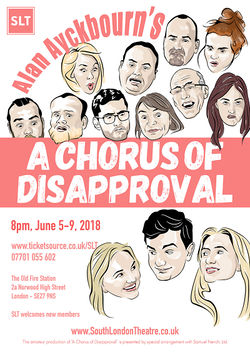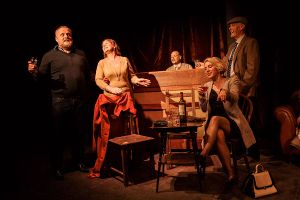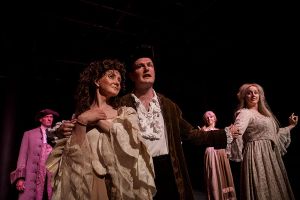Difference between revisions of "A Chorus of Disapproval (2018)"
Matthew lyne (Talk | contribs) (→See Also) |
(→Reminiscences and Anecdotes) |
||
| Line 130: | Line 130: | ||
== Reminiscences and Anecdotes == | == Reminiscences and Anecdotes == | ||
| − | + | '''The Director's view''' | |
| + | |||
| + | Lisa Thomas gives us the inside story on directing this popular play, our next show at SLT | ||
| + | |||
| + | |||
| + | ''What do you think is the enduring appeal of Alan Ayckbourn, and especially this play?'' | ||
| + | |||
| + | Alan Ayckbourn is an explorer of seemingly ordinary people and the strangeness and eccentricity that lurks beneath everyday lives. I was looking for a play about theatre and performance to do in the new theatre space. | ||
| + | |||
| + | Originally I thought of Michael Frayn’s ''Noises Off'', with its intricate onstage and backstage plot and immense set, but that wasn’t available for performance. Then I remembered this play, which is about 30 years old now, but still feels fresh and funny. Reading it I loved the fact that the characters, although ‘types’ were brilliantly drawn to create individuals with a fascinating network of interrelationships. It also speaks to anyone involved in non-professional theatre of the difficulties inherent in weaving it together with people’s jobs and the other parts of their lives. | ||
| + | |||
| + | Reviews of professional productions suggest that they have over-egged the ‘amateurishness’ of the society while failing to foreground the wonderfully written characters, whose relationships are the heart of the play. I also love the way that Ayckbourn has managed to echo in the snatches of song from The Beggar’s Opera what is going on in the play. | ||
| + | |||
| + | |||
| + | ''For those of us who haven’t seen this one, can you give us a brief plot summary?'' | ||
| + | |||
| + | Guy Jones, a young widower slightly adrift in a small town, joins PALOS (Pendon Light Operatic Society) to make friends and give himself something to do. With the enthusiastic encouragement of Dafydd ap Llewellyn, the director, he takes on a small role in their production of John Gay’s The Beggars’ Opera. | ||
| + | |||
| + | As rehearsals progress, Guy finds, by way of never saying no to anything that he is asked to do, that he is embroiled in relationships with several members of the society – both in a romantic and business sense. He also progresses, as other male members fall by the wayside, from a tiny bit part to the lead, but at the expense of the goodwill of other members of the society. | ||
| + | |||
| + | |||
| + | ''How have you interpreted this script for today?'' | ||
| + | |||
| + | The script is actually pretty timeless and while we could have set it in the 1980s when the play was written and first performed, there didn’t seem to be a need to do this so this production is set in the present day. Anyone who’s a member of SLT and has worked on a show will recognise many aspects of the story – and perhaps one or two of the characters. | ||
| + | |||
| + | Guy’s predicament – of loneliness and wanting to fit in – is relevant at any time, and while certain individuals’ predilections are less fashionable now that they were then, they are still going on and have perhaps even more comedic value than they did then. | ||
| + | |||
| + | |||
| + | ''Tell us about the challenges of directing this play'' | ||
| + | |||
| + | The greatest hurdle has been meshing the music and drama together. I had hoped to find an actor who played piano to play Mr Ames and accompany the singing, but it was not to be. I had underestimated the quantity of music and the difficulty of singing some of it and had cast for character, rather than whether the actor’s voice matched that of the role their character is playing in The Beggar’s Opera (with a couple of notable exceptions). | ||
| + | |||
| + | I have been hugely aided in getting over this by the cast’s willingness to push themselves to the limit in terms of their voices. And also, by the wonderfully patient and helpful Alan Walker, who was willing to subject his family and neighbours to our singing for several lengthy sessions where he persuaded a couple of people to use their high ‘head’ voices and taught multi-part harmony. Stevie Hughes at Bromley Little Theatre also kindly gave me access to the music he had recorded for BLT’s production a couple of years ago which has proved invaluable. | ||
== See Also == | == See Also == | ||
Latest revision as of 12:54, 21 June 2021

Performances: Tuesday 5th – Saturday 9th June 2018 and Saturday matinee, Old Fire Station
Contents
Introduction
The action takes place in various locations over the course of about five months as PALOS (Pendon Amateur Light Operatic Society) rehearse their production of JohnGay's The Beggar's Opera.
Cast
- Guy Jones – Adam Crook
- Dafydd ap Llewellyn – Jason Salmon
- Hannah Llewellyn – Daisy Swayne
- Bridget Baines – Siobhán Campbell
- Mr Ames – David Carr
- Enid Washbrook – Kay Anderson
- Rebecca Huntley-Pike – Audrey Lindsay
- Fay Hubbard – Penny Thomas
- Ian Hubbard – Chris Bennett
- Jarvis Huntley-Pike – Derek Dempsey
- Ted Washbrook – Ian Cuthbert
- Crispin Usher – David Clements
- Linda Washbrook – Kelly-Kim Cranstoun
Crew
- Stage Manager - Kay George
- Assistant Director & ASM - Tom Johnson
- Repetiteur - Alan Walker
- Assistant Stage Manager - David Blatcher
- Lighting Designer - Sean Thomas, Joel Mansi Thomas, Chaz Doyle
- Sound - Adam Crook
- Sound & Lighting Operators - Lee Ridgeway & Rachael Lovegrove
- Set Construction - Mark Ireson
Thanks
Withe many thanks to: Stevie Hughes and Bromley Little Theatre for letting us have their piano accompaniment, Alan Walker (and his longsuffering family and neighbours) for teaching us the songs and hosting several music rehearsals, Schotts Music for digging out a copy of The Beggar's Opera score, Emma-Jane Wilson for looking after the piano until it could return to SLT.
Reviews
Anne Gilmour
Jo Matthews and I had a very enjoyable evening at SLT Gala performance of this excellent Alan Ayckbourn play. Great to see their newly refurbished theatre: still a little more work to do, but much more open and light and a lovely new performance space. Thank you SLT for a great evening.
Charlotte Benstead
Everyone has already said lovely things about ‘Chorus’ so hope everyone who can, gets to the matinee tomorrow – lots of laughs and a great cast who all get their moment to shine. Really enjoyable show – aren’t we lucky to have so many fabulous people in our club!
James Griffin
Chorus of Disapproval: yet another wonderful production. Thanks for loss of laughs and a great evening and lovely to see so many of you. The refurbished theatre looks (and smells) lovely.
Jessica Osorio
Loved the show last night. Congratulations to Lisa and all the cast and crew. Laughed a lot. Few moments that brought back memories of shows I have worked on
Lee Ridgeway
A massive well done to Lisa and all the cast and crew for ‘Chorus’ last night. It was lovely to actually watch it. I laughed LOTS...
Will Howells
Absolute joy seeing @SLTheatre‘s A Chorus of Disapproval last night. Very funny with some brilliant cringe moments for anyone who’s done amateur musicals.
Clive Manning
A Chorus – seriously good work from a seriously good cast. Loved every minute.
Chaz Doyle
It’s wonderful! Some brilliantly comic performances with touches of sweet heartache.
Carole Coyne
Lisa has really made the most of her very talented cast for this clever Ayckbourn play about an amateur dramatic company and their intrigues and relationships. We can all relate to some of the characters I am sure but this group manage to cram rather more colourful experiences into one show than we do! Keep an eye out for some of the characters who are not speaking who are giving wonderful little cameos. There is a great scene too between Kelly and Siobhan but no spoilers. A shout out too to Alan Walker who got just the right amount of professionalism from the singers.
Christine Theophilus
Wonderful first night at SLT – what a fabulous show Chorus is – and what a great company! Congratulations!
Norwood Action Group
Thanks for the invite to tonight’s gala performance. NAG loved it and can’t wait to return. Amazing talent in our midst and such a dedicated team working ‘behind the scenes’ to bring this special place to life again. Keep up the great work.
Ingrid Murphy
Go and see this play! I went on the opening night and really enjoyed it! I love Ayckbourn anyway and the cast was great! Everyone committed to their role and it was a nice flow to the production. The ‘fight’ scenes were very funny (in a good way!) and I want to give a shout out to Jason Salmon as Dafydd. He played Dafydd fantastically – brilliant comedic timing, totally in character throughout and he was perfect in the role! A thoroughly enjoyable evening – well done to all cast and crew!
Sardines review (Paul Johnson)
South London Theatre has been through a massive upheaval over the past couple of years. Sardines readers will remember that in order to survive the society, whose home is based at the Grade 2 listed Old Fire Station (horse-drawn!) in London’s West Norwood, was forced to move out of the 19th century building while a major restoration project was initiated with the help of Heritage Lottery Funding.
Well, this week I was lucky enough to attend the fifth production since SLT moved back into its revamped and highly impressive theatre space – which is now also a community heritage site. As someone who spent many an evening watching shows and plays at SLT’s ‘old’ Bell Theatre (main) and Prompt Corner (studio), you would hardly recognise the place now; there’s even a modern lift servicing the whole building.
The venue’s new versatile, intimate 100-seat auditorium is currently playing host to Alan Ayckbourn’s 1984 am-dram masterpiece, A Chorus of Disapproval... a title many of us have either seen of been part of over the years. Made into a star-studded film in 1989 by Michael Winner and featuring a who’s who of British acting talent such as Anthony Hopkins, Jeremy Irons, Jenny Seagrove, Prunella Scales and Richard Briars to name just a few, Ayckbourn’s play is a fond (if not slightly exaggerated) snapshot of the goings-on in amateur theatre societies all over the country.
Guy Jones is a recent widower who decides to try out for Pendon Amateur Light Operatic Society and their upcoming production of The Beggars’ Opera. The naive – and much-needed – male performer is an instant hit with the group’s highly dedicated director, Dafydd ap Llewellyn, as well as most of the society’s middle-aged, married women. Through one way or another, including several intimate encounters, Guy finds himself being promoted from a one-line role to the lead part of Macheath, where somehow, by the time of the run, he seems to have upset virtually everyone.
SLT’s production is very funny and well-cast throughout with emphasis on vividly bringing Ayckbourn’s characters to life. Unfortunately, the singing (throughout the play we hear excerpts from various rehearsals as well as some of the final production) isn’t up to much more than resembling something of a cats’ chorus, which is a little surprising as the fictitious society is after all supposed to be an ‘operatic’ one – so surely, there would have been a number of strong singers within its membership! As it isn’t obvious to tell whether or not the cast have been directed to deliberately sing under-par it’s impossible to throw too much judgement but I did find myself feeling rather sorry for PALOS’s fictitious paying customers.
Away from the music, I adore how director Lisa Thomas has squeezed every ounce of comedy from her cast and Ayckbourn’s very funny script. In an ensemble-heavy play, top marks must go right across the board but with special plaudits to Jason Salmon’s remarkable portrayal of proud Welshman Dafydd ap Llewellyn; Adam Crook’s unfortunate innocent Guy (he just needs to learn to say ‘no’); Siobhán Campbell’s terrifying Bridget (her constant mocking of and eventual fight with Kelly-Kim Cranstoun as Linda is beautifully done); Penny Thomas as swinging wife, Fay (always partial to a bit of VEAL); and Ian Cuthbert as cuddly-but-can’t-act-for-toffee Ted Washbrook, who Dafydd hilariously upsets in one of his passionate rants.
Gallery
- Photos by Chris Patmore
Reminiscences and Anecdotes
The Director's view
Lisa Thomas gives us the inside story on directing this popular play, our next show at SLT
What do you think is the enduring appeal of Alan Ayckbourn, and especially this play?
Alan Ayckbourn is an explorer of seemingly ordinary people and the strangeness and eccentricity that lurks beneath everyday lives. I was looking for a play about theatre and performance to do in the new theatre space.
Originally I thought of Michael Frayn’s Noises Off, with its intricate onstage and backstage plot and immense set, but that wasn’t available for performance. Then I remembered this play, which is about 30 years old now, but still feels fresh and funny. Reading it I loved the fact that the characters, although ‘types’ were brilliantly drawn to create individuals with a fascinating network of interrelationships. It also speaks to anyone involved in non-professional theatre of the difficulties inherent in weaving it together with people’s jobs and the other parts of their lives.
Reviews of professional productions suggest that they have over-egged the ‘amateurishness’ of the society while failing to foreground the wonderfully written characters, whose relationships are the heart of the play. I also love the way that Ayckbourn has managed to echo in the snatches of song from The Beggar’s Opera what is going on in the play.
For those of us who haven’t seen this one, can you give us a brief plot summary?
Guy Jones, a young widower slightly adrift in a small town, joins PALOS (Pendon Light Operatic Society) to make friends and give himself something to do. With the enthusiastic encouragement of Dafydd ap Llewellyn, the director, he takes on a small role in their production of John Gay’s The Beggars’ Opera.
As rehearsals progress, Guy finds, by way of never saying no to anything that he is asked to do, that he is embroiled in relationships with several members of the society – both in a romantic and business sense. He also progresses, as other male members fall by the wayside, from a tiny bit part to the lead, but at the expense of the goodwill of other members of the society.
How have you interpreted this script for today?
The script is actually pretty timeless and while we could have set it in the 1980s when the play was written and first performed, there didn’t seem to be a need to do this so this production is set in the present day. Anyone who’s a member of SLT and has worked on a show will recognise many aspects of the story – and perhaps one or two of the characters.
Guy’s predicament – of loneliness and wanting to fit in – is relevant at any time, and while certain individuals’ predilections are less fashionable now that they were then, they are still going on and have perhaps even more comedic value than they did then.
Tell us about the challenges of directing this play
The greatest hurdle has been meshing the music and drama together. I had hoped to find an actor who played piano to play Mr Ames and accompany the singing, but it was not to be. I had underestimated the quantity of music and the difficulty of singing some of it and had cast for character, rather than whether the actor’s voice matched that of the role their character is playing in The Beggar’s Opera (with a couple of notable exceptions).
I have been hugely aided in getting over this by the cast’s willingness to push themselves to the limit in terms of their voices. And also, by the wonderfully patient and helpful Alan Walker, who was willing to subject his family and neighbours to our singing for several lengthy sessions where he persuaded a couple of people to use their high ‘head’ voices and taught multi-part harmony. Stevie Hughes at Bromley Little Theatre also kindly gave me access to the music he had recorded for BLT’s production a couple of years ago which has proved invaluable.



